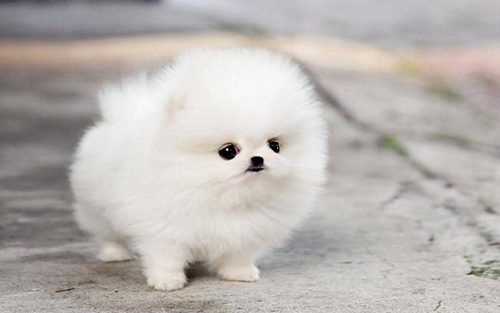Lively and affectionate Japanese fluffy dogs are increasingly popular in families. To start raising a Japanese dog, you first need to know how to take care of a Japanese dog first. The following article will share the necessary experiences for you.

How to take care of Japanese dogs: Learn the eating habits of Japanese dogs
Japanese dogs have a poor digestive system and are quite picky eaters, so you need to pay attention to the diet for dogs that are reasonable and sufficient. They are quite small in appearance, so the amount of food per day is not much. You just need to consider choosing the right food.
The most scientific way of feeding is based on the age of the Japanese dog breed to prepare food. Specifically:
1. How to take care of Japanese dogs in the period 1-2 months old
At this stage, puppies mainly drink milk and eat more food in addition to liquid, it is best to cook more porridge for the puppy to eat. Because the puppy's stomach is still immature, the food must be boiled and diluted.
To enhance nutrition, you can add minced pork or chicken to cook with porridge. This also helps the puppy get used to new foods.
If you want to give your puppy more dry food, you can soak it until it's soft or crush it into small pieces before it can be eaten.
For Japanese puppies at this stage of 1-2 months of age, you should also feed your dog many meals a day, preferably about 4-5 meals / day, a little bit each meal. This helps the puppy to digest, because the puppy's digestive system is not yet fully developed.
In addition, you can also give warm puppy milk in the evening to provide more protein and calcium, to help puppies grow stronger.
2. How to take care of Japanese dogs in the 3-6 month period
At the 3-month-old stage, the puppies have gained weight, grown, the digestive system has also gradually improved, so you can give them solid porridge or soft rice. You can feed them with cooked meat or stewed bones and then give them water to eat. The use of bone water will provide protein and calcium to help dogs be healthier.
Besides, you can also give them more vegetables, tubers, fruits, grains to provide more minerals, vitamins and starch for it. In particular, pumpkin and carrots contain a lot of vitamin A, which helps the puppy's eyesight and strengthens the dog's resistance. Cereals contain a lot of vitamin B1, so cereals will stimulate digestion and increase appetite for Japanese dogs.
Regarding the number of meals, you can feed 3 main meals and 1.2 snacks.
3.How to take care of Japanese dogs over 6 months old
At this stage, Japanese dogs are maturing, so the demand for protein, calcium, lipids, vitamins and minerals also increases. You still give them the same foods you gave them at 3-6 months old but need to increase the amount. At this point, you can still only eat soft and wet foods.
In addition, you can also feed Japanese dogs with eggs to supplement nutrition. Eggs are rich in vitamin D and vitamin B1, so you should only feed them 1-2 times a week to avoid causing excess.
When the dog is older, the digestive system is better, we should train them to eat mainly at the main meal, divided into 2 or 3 main meals a day.
Some things you need to keep in mind when feeding Japanese dogs and taking care of Japanese dogs
1. Note when feeding Japanese dogs
– You need to prepare water for dogs so that when thirsty they can drink by themselves, so change the water 3 times a day to ensure hygiene.
- It is necessary to feed Japanese dogs full and on time, do not give dogs too much in one meal to create better eating habits for dogs.
– Do not give Japanese dogs bones, foods that are too dry, spicy, hot or cold, foods containing a lot of fat, animal organs because they will cause digestive disorders leading to diarrhea.
– After eating, the eating utensils for dogs need to be cleaned, avoiding the situation of leaving food on the tray, causing flies, mosquitoes, cockroaches to drag to cause unsanitary.
2. Notes on how to take care of Japanese dogs
– Japanese dogs love to run and jump, so you should take advantage of the time to take your dog for a walk every day.
Bathe the dog once a week, do not bathe regularly.
Brush it regularly to help remove dead hair and make it shiny.
- You should take your dog for regular health check-ups.
Here is some information about How to take care of Japanese dogs that eat quickly that we want to share with you. Wish you have healthy, lovely Japanese dogs. If you need to know more about other ways to take care of Japanese dogs, please contact http://vanchuyenchomeo.com/ for advice.